Filter by
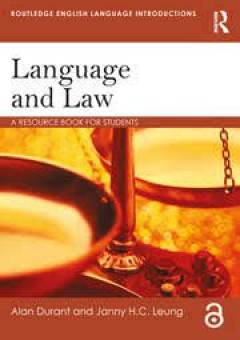
Language and Law A resource book for students
Language plays an essential role both in creating law and in governing its implementation. Providing an accessible and comprehensive introduction to this subject, Language and Law:describes the different registers and genres that make up spoken and written legal language and how they develop over time; analyses real-life examples drawn from court cases from different parts of the world, illustr…
- Edition
- -
- ISBN/ISSN
- 9781138025585
- Collation
- -
- Series Title
- -
- Call Number
- -
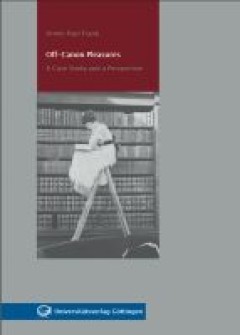
Off-Canon pleasures : A case study and a perspective
The inclusion of works in a canonical list creates a large body of exclusions. But among these neglected works there are not a few that nevertheless are worth reading. Literary worth is not necessarily aesthetic impeccability. A literary work recommends itself by a high degree of artistic achievement with elbowroom for historical importance. The present study focuses on Leo Rosten’s immigrati…
- Edition
- -
- ISBN/ISSN
- 9783941875951
- Collation
- -
- Series Title
- -
- Call Number
- 813 FRA o
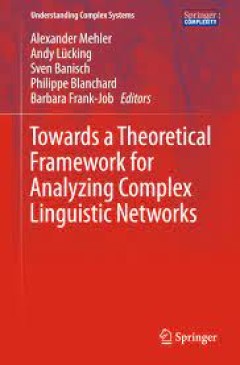
Towards a Theoretical Framework for Analyzing Complex Linguistic Networks
The aim of this book is to advocate and promote network models of linguistic systems that are both based on thorough mathematical models and substantiated in terms of linguistics. In this way, the book contributes first steps towards establishing a statistical network theory as a theoretical basis of linguistic network analysis the boarder of the natural sciences and the humanities. This book a…
- Edition
- -
- ISBN/ISSN
- 978-3-662-47238-5
- Collation
- -
- Series Title
- -
- Call Number
- -
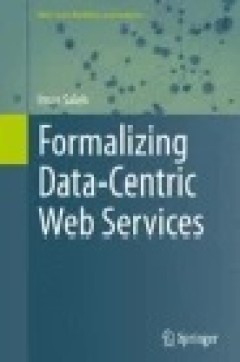
Formalizing Data-Centric Web Services
The Web has evolved from an information sharing medium to a wide-scale environment for sharing capabilities or services. Currently, URLs not only point to documents and images, but are also used to invoke services that potentially change the state of the Web. Major online organizations today, such as Amazon, PayPal and FedEx, provide services for users and consumers. They also allow third-party…
- Edition
- -
- ISBN/ISSN
- 978-3-319-24678-9
- Collation
- XIII, 131 pages
- Series Title
- Web-Scale Workflow and Analytics
- Call Number
- -
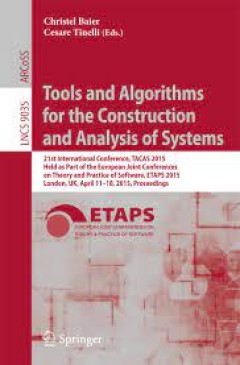
Tools and Algorithms for the Construction and Analysis of Systems 21st Inter…
This book constitutes the proceedings of the 21st International Conference on Tools and Algorithms for the Construction and Analysis of Systems, TACAS 2015, which took place in London, UK, in April 2015, as part of the European Joint Conferences on Theory and Practice of Software, ETAPS 2015. The 45 papers included in this volume, consisting of 27 research papers, 2 case-study papers, 7 regular…
- Edition
- -
- ISBN/ISSN
- 978-3-662-46681-0
- Collation
- -
- Series Title
- -
- Call Number
- -
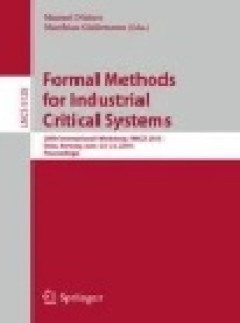
Formal Methods for Industrial Critical Systems
This book constitutes the proceedings of the 20th International Workshop on Formal Methods for Industrial Critical Systems, FMICS 2015, Oslo, Norway, in June 2015. The 12 papers presented in this volume were carefully reviewed and selected from 20 submissions. They are organized in topical sections: applications; protocols; specification and analysis; verification.
- Edition
- -
- ISBN/ISSN
- 9783319194585
- Collation
- XVI, 213 hlm.
- Series Title
- Lecture Notes in Computer Science
- Call Number
- -
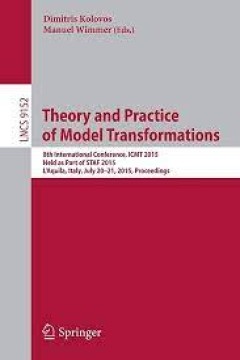
Theory and Practice of Model Transformations 8th International Conference, I…
This book constitutes the refereed proceedings of the 8th International Conference on Model Transformation, ICMT 2015, held in L'Aquila, Italy, in July 2015, as Part of STAF 2015, the federation of a number of the leading conferences on software technologies. The 16 revised papers were carefully selected from 34 submissions. The papers are organized in topical sections on change management; reu…
- Edition
- -
- ISBN/ISSN
- 978-3-319-21155-8
- Collation
- -
- Series Title
- -
- Call Number
- -
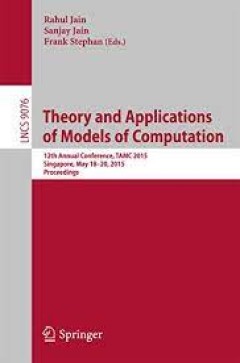
Theory and Applications of Models of Computation 12th Annual Conference, TAM…
This book constitutes the refereed proceedings of the 12th Annual Conference on Theory and Applications of Models of Computation, TAMC 2014, held in Singapore, in May 2015. The 35 revised full papers presented were carefully reviewed and selected from 78 submissions. The papers treat all topics relating to the theory and applications of models computation, for example recursion theory and mathe…
- Edition
- -
- ISBN/ISSN
- 978-3-319-17142-5
- Collation
- -
- Series Title
- -
- Call Number
- -
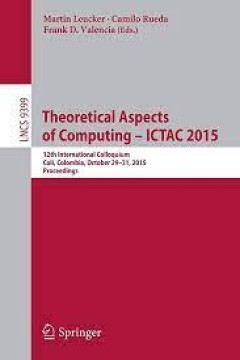
Theoretical Aspects of Computing - ICTAC 2015 12th International Colloquium,…
This book constitutes the refereed proceedings of the 12th International Colloquium on Theoretical Aspects of Computing, ICTAC 2015, held in Cali, Colombia, in October 2015. The 25 revised full papers presented together with 7 invited talks, 3 tool papers, and 2 short papers were carefully reviewed and selected from 93 submissions. The papers cover various topics such as algebra and category…
- Edition
- -
- ISBN/ISSN
- 978-3-319-25150-9
- Collation
- -
- Series Title
- -
- Call Number
- -
The SenticNet Sentiment Lexicon: Exploring Semantic Richness in Multi-Word Co…
The research and its outcomes presented in this book, is about lexicon-based sentiment analysis. It uses single-, and multi-word concepts from the SenticNet sentiment lexicon as the source of sentiment information for the purpose of sentiment classification. In 6 chapters the book sheds light on the comparison of sentiment classification accuracy between single-word and multi-word concepts, …
- Edition
- -
- ISBN/ISSN
- 978-3-319-38971-4
- Collation
- -
- Series Title
- -
- Call Number
- -
 Computer Science, Information & General Works
Computer Science, Information & General Works  Philosophy & Psychology
Philosophy & Psychology  Religion
Religion  Social Sciences
Social Sciences  Language
Language  Pure Science
Pure Science  Applied Sciences
Applied Sciences  Art & Recreation
Art & Recreation  Literature
Literature  History & Geography
History & Geography